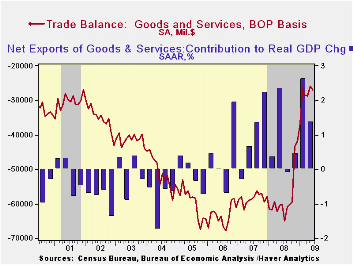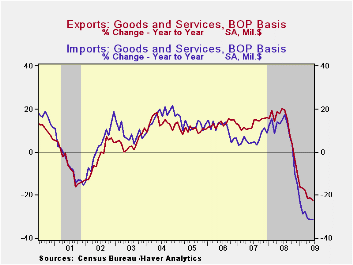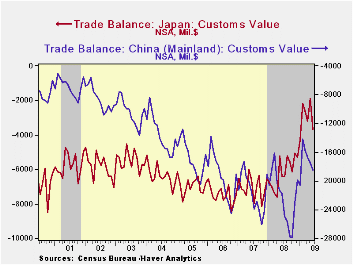 Global| Aug 12 2009
Global| Aug 12 2009U.S. Trade Deficit Remains Near The Narrowest Since 2001
by:Tom Moeller
|in:Economy in Brief
Summary
As the U.S. recession continued, the foreign trade deficit remained near its narrowest level 2001. The deficit of $27.0B was just slightly deeper than the unrevised May level of $26.0B. Consensus expectations had been for a deficit of [...]

As the U.S. recession continued, the foreign trade deficit remained near its narrowest level 2001. The deficit of $27.0B was just slightly deeper than the unrevised May level of $26.0B. Consensus expectations had been for a deficit of $28.5B. Higher petroleum imports have been the main source of upward pressure on the trade deficit recently. Higher crude oil prices raised them by more than one-quarter during June and by 12.2% so far this year. Offsetting that increase was the U.S. recession which caused June nonpetroleum imports to fall by 1.0%. That pulled their decline so far this year to 15.7%. Higher exports were the second factor which limited trade deficit deterioration during June. The competitive foreign exchange value of the dollar helped exports to rise by 2.0% after a firm 1.6% gain during May. Nevertheless, recessions abroad have lowered exports by 5.4% since December.
 The rise in petroleum imports was driven by higher crude oil
prices. They rose to a June average of $59.17 per barrel versus the
February low of $39.22. The recession and the rise in prices prompted,
however, a decline in the volume of petroleum imports. Despite a June
gain they have fallen roughly ten-percent since December. The recession
has had the additional effect on limiting the size of the trade deficit
by dropping nonoil goods imports. They fell a hefty 1.0% during June
for the ninth sharp monthly decline in a year.
The rise in petroleum imports was driven by higher crude oil
prices. They rose to a June average of $59.17 per barrel versus the
February low of $39.22. The recession and the rise in prices prompted,
however, a decline in the volume of petroleum imports. Despite a June
gain they have fallen roughly ten-percent since December. The recession
has had the additional effect on limiting the size of the trade deficit
by dropping nonoil goods imports. They fell a hefty 1.0% during June
for the ninth sharp monthly decline in a year.
Adjusted for price inflation overall and for higher oil prices specifically, the trade deficit in goods actually narrowed slightly during June to $35.9B, the lowest since 1999. It was down from $45.3B last June. Real non-auto consumer goods imports fell a hard 4.8% m/m and are down 17.8% y/y, near their lowest level since 2005. Automotive vehicles & parts imports were down by exactly one-half versus last year. Non-auto capital goods imports continued to reflect the weakness in investment and fell 24.4% y/y near their lowest level since 2004.
Though services imports rose 2.3% during June that followed ten months of decline and they were off by nearly one-third y/y. Travel imports were down 12.8% y/y as passenger fares dropped by 9.0%.
 Real exports added 0.6% to their 1.9% gain during May.
Nevertheless, recessions abroad caused them to fall by 21.4%
year-to-year to near the lowest level since late-2005. The chained
dollar value of non-auto consumer goods exports slipped m/m and were
down 13.8% y/y. Real capital goods exports jumped 1.5% but were off
20.6% y/y while exports of automobiles & parts were off by
roughly one-half from last year.
Real exports added 0.6% to their 1.9% gain during May.
Nevertheless, recessions abroad caused them to fall by 21.4%
year-to-year to near the lowest level since late-2005. The chained
dollar value of non-auto consumer goods exports slipped m/m and were
down 13.8% y/y. Real capital goods exports jumped 1.5% but were off
20.6% y/y while exports of automobiles & parts were off by
roughly one-half from last year.
Nominal exports of services rose 1.3% (-11.5% y/y) for the first material increase since last fall. Travel exports fell 18.8% y/y as fewer foreign citizens came to the U.S. even as passenger fares fell 22.5%.
The U.S. trade deficit in goods with China deepened again, during June to $18.4B. Imports from China fell 14.1% y/y while U.S. exports fell a lesser 10.3%. The trade deficit with Japan deepened sharply to $3.7B but it remained near its shallowest since 1990. The U.S. recession drove imports from Japan down by 36.5% year-to-year while U.S. exports to the country fell by 30.4%.
| Foreign Trade | June | May | Y/Y | 2008 | 2007 | 2006 |
|---|---|---|---|---|---|---|
| U.S. Trade Deficit | $27.0B | $26.0B | $60.2B (6/08) | $695.9 | $701.4 | $760.4 |
| Exports - Goods & Services | 2.0% | 1.6% | -22.2% | 11.2% | 13.2% | 13.3% |
| Imports - Goods & Services | 2.3% | -0.6% | -31.1% | 7.6 | 6.0% | 10.8% |
| Petroleum | 23.8% | -3.4% | -51.9% | 37.0% | 9.4% | 20.1% |
| Nonpetroleum Goods | -1.0% | 0.1% | -29.1% | 1.5% | 4.8% | 9.1% |
Tom Moeller
AuthorMore in Author Profile »Prior to joining Haver Analytics in 2000, Mr. Moeller worked as the Economist at Chancellor Capital Management from 1985 to 1999. There, he developed comprehensive economic forecasts and interpreted economic data for equity and fixed income portfolio managers. Also at Chancellor, Mr. Moeller worked as an equity analyst and was responsible for researching and rating companies in the economically sensitive automobile and housing industries for investment in Chancellor’s equity portfolio. Prior to joining Chancellor, Mr. Moeller was an Economist at Citibank from 1979 to 1984. He also analyzed pricing behavior in the metals industry for the Council on Wage and Price Stability in Washington, D.C. In 1999, Mr. Moeller received the award for most accurate forecast from the Forecasters' Club of New York. From 1990 to 1992 he was President of the New York Association for Business Economists. Mr. Moeller earned an M.B.A. in Finance from Fordham University, where he graduated in 1987. He holds a Bachelor of Arts in Economics from George Washington University.
More Economy in Brief
 Global| Feb 05 2026
Global| Feb 05 2026Charts of the Week: Balanced Policy, Resilient Data and AI Narratives
by:Andrew Cates






